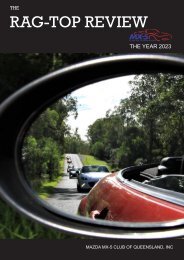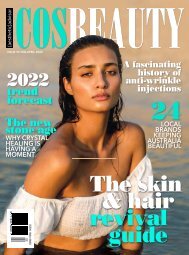CosBeauty Magazine #86
CosBeauty is the #BeautyAddict's guide to lifestyle, health and beauty in Australia. In this issue: - The 2019 Christmas Gift Guide - City Skin Detox - Fool Proof Steps for Party Survival - Diet is a Dirty Word - Hair Trends from Catwalk Zimmerman - Fertility Options for Cancer Survivors
CosBeauty is the #BeautyAddict's guide to lifestyle, health and beauty in Australia.
In this issue:
- The 2019 Christmas Gift Guide
- City Skin Detox
- Fool Proof Steps for Party Survival
- Diet is a Dirty Word
- Hair Trends from Catwalk Zimmerman
- Fertility Options for Cancer Survivors
You also want an ePaper? Increase the reach of your titles
YUMPU automatically turns print PDFs into web optimized ePapers that Google loves.
Dr Raewyn Teirney and one of<br />
her specialised fertility nurses.s.<br />
Dr Raewyn Teirney<br />
• Approximately 80-90% of eggs<br />
would survive warming in the future;<br />
• Approximately 50-80% of surviving<br />
eggs would fertilise;<br />
• Approximately 80-90% of fertilised<br />
eggs would develop into embryos;<br />
and<br />
• A single embryo would have a<br />
20-35% chance of developing into<br />
a pregnancy.<br />
(Source: IVF Australia)<br />
‘So, we see that medically, many<br />
women who have been diagnosed with<br />
cancer are able to achieve their dreams<br />
of conceiving, enjoying a healthy<br />
pregnancy and becoming a mother,’<br />
says Dr Teirney.<br />
Often there are only a few days<br />
between diagnosis and beginning<br />
treatment, explains Professor Bill<br />
Ledger who heads up the Fertility<br />
Research Centre at the Royal<br />
Hospital for Women in Sydney. ‘It is<br />
something the oncologists want to<br />
do quickly for obvious reasons. If the<br />
cancer is aggressive, they might not<br />
have much time.<br />
‘The likelihood of these women<br />
achieving their dreams of having a<br />
family is generally quite good,’ says<br />
Professor Ledger. ‘If we can freeze<br />
five or six embryos, or 12 eggs from<br />
someone under 35, then her chance of<br />
having at least one child is better than<br />
fifty-fifty. You can never guarantee,<br />
of course. Things can go wrong –<br />
eggs don’t always fertilise, embryos<br />
don’t always implant, but if we get a<br />
reasonable number in the bank and she<br />
is younger, then it is a better chance.<br />
If a woman is 40 or over then of course<br />
the chances aren’t as high.’<br />
Pre-teens and<br />
pre-pubescent girls<br />
But what of girls who haven’t yet<br />
reached puberty? What are their<br />
options? Australian-led technology<br />
is proving to pave the way globally<br />
for such patients, by freezing ovarian<br />
tissue from pre-pubescent girls with<br />
the plan to graft it once cancer<br />
treatment is completed and when<br />
fertility is required. Melbourne fertility<br />
specialist, Dr Kate Stern, is leading<br />
the advancements in this area and,<br />
to date, her group has taken tissue<br />
from over 400 women and young girls<br />
facing infertility as a result of their<br />
cancer treatment.<br />
‘We have been storing ovarian<br />
tissue for 20 years now,’ she says.<br />
‘Obviously, in the early days, we<br />
weren’t as confident of success,<br />
but in the last few years there has<br />
been enormous progress in research.<br />
Our first birth – twins – was in 2014.<br />
We have now put tissue back into<br />
around 26 patients and have had<br />
five babies. We have only been<br />
storing tissue taken from young<br />
girls for a few years, in collaboration<br />
with the team at the Royal Children’s<br />
Hospital. We have not yet had<br />
any requests to graft tissue into<br />
women who were children at the<br />
time of their cancer treatment.<br />
These patients have not yet reached<br />
an age where they are ready to<br />
become parents, however we are<br />
optimistic that the technology will<br />
be very successful’.<br />
We now get referrals to help<br />
preserve fertility for children and<br />
young women, especially those with<br />
breast cancer, which is one of the<br />
commonest cancers in women of<br />
reproductive age. For these women<br />
with breast cancer, we mainly still<br />
do egg freezing. However there have<br />
been some women who have not<br />
had enough time, so we have taken<br />
ovarian tissue. For some women we<br />
do both.<br />
‘We also currently have a grant<br />
with the Sony Foundation which,<br />
for young patients aged between<br />
13 and 30, covers the cost of transport<br />
and processing, allowing young<br />
people now the opportunity for best<br />
practice fertility preservation, even<br />
if they live a long way away from a<br />
major city. This is such an exciting<br />
opportunity to expand access to care<br />
for all young people who need our<br />
specialised services.’<br />
www.cosbeauty.com.au 119


















